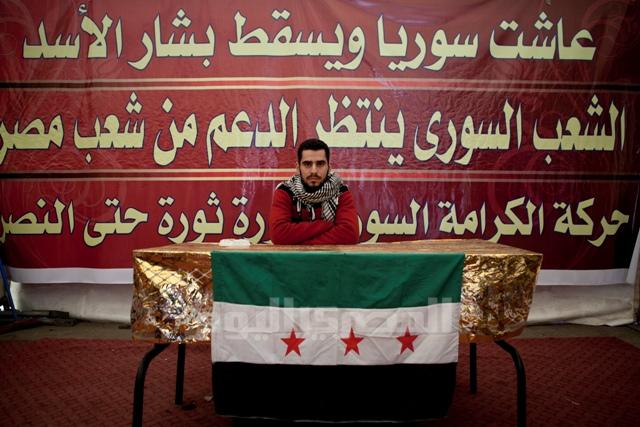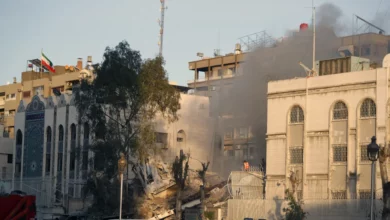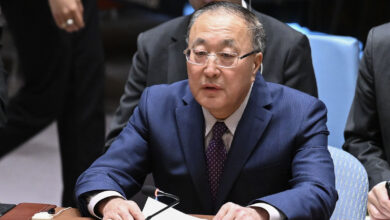
Bashar al-Assad’s army is barraging residential buildings and hospitals in the besieged city of Homs, killing dozens of women and newborns. Gamal al-Omar rushes to his laptop to check if his activist friends back home have sent him news or videos.
“What should we do? Bomb ourselves?” Omar despondently asks his friend Hossam Malas, wondering if Syria’s revolutionaries should use the tactics of suicide bombers.
In a cramped apartment in the Cairo neighborhood of Dokki, Omar, Malas and Hadeel Kokystay remained glued to Al Jazeera nearly 24 hours a day, watching a war unfold in their home as Syria’s dictator tries to cling to power in the face of increasing resistance.
Omar is a Syrian revolutionary who fled the country a few weeks ago after he learned that Syrian troops were searching for him again, shortly after he was released from detention for his activity in protests and video journalism. He is one of hundreds of pro-revolution Syrians living in Cairo and making Egypt their base in the battle against Assad’s regime. Some, like Omar, left to escape Assad’s army and security forces. Others have been longtime expats in Egypt.
These days, they are banding together to help their countrymen shake off a dictatorship that has held power for four decades, staging protests, collecting and distributing donations, pressuring the Arab league and Egyptian authorities to deport the Syrian ambassador, and sharing information from inside Syria with international media outlets.
There are three main Syrian revolutionary movements based in Cairo: the Muslim Brotherhood-dominated Syrian Revolution Association in Egypt (SRAE), the politically moderate Dignity movement led by opposition leader Moataz Shaqlab, and the Syrian Freedom Youth, which mainly constitutes Syrian youth and university students without specific political affiliations.
“We all work for the same goal, the fall of the regime, and it will fall, there is no doubt,” said Salma al-Gaza’erly, member in the media committee of the SRAE.
The Syrian uprising erupted when mass protests started on 15 March 2011 in Deraa, in the country’s south and then spread to the rest of the country. The protests call for the resignation of Assad and the overthrow of his regime.
Since then, Assad deployed tanks and snipers to disperse protests, killing more than 6,000 civilians and injuring thousands more, according to United Nations estimates. As a result, the Arab League suspended Syria’s membership in November to pressure Assad to end violence against protesters, but in vain.
Tunisia and Libya expelled their Syrian ambassadors while the US, France and the Gulf countries withdrew their ambassadors from Damascus as violence continued. However, Russia and China’s 4 February veto of a UN Security Council resolution calling for the Syrian president to step down was the regime’s cue to intensify its crackdown.
In the summer of 2011, the Syrian opposition created a coalition called the Syrian National Council based in Istanbul, Turkey, to act as a government in exile. The government has gained the diplomatic recognition of five UN members. This is in addition to the Free Syrian Army, the body composed of defectors from the regime’s army forces who refuse to obey orders to kill civilians. However, the exact numbers are unclear.
“These people are not human, it’s impossible,” said Malas, referring to Assad’s regime and his army loyalists. “Israel wouldn’t do what Assad is doing if it occupied Syria.”
Malas, who is from Damascus, came to Cairo two months ago to join dozens of his fellow Syrian revolutionaries, hoping they could serve the revolution better from Egypt. He has been living in Russia for the past 17 years and was last in his home country 10 years ago.
Their friend Koky also joined Malas and Omar in Cairo after the Free Syrian Army, which is composed of defectors from the Syrian army, helped smuggle her across the Syrian-Turkish border.
“Before the uprising, I wasn’t politically active at all. Just like all Syrian youth, we were always marginalized from politics. When we saw the other Arab Spring revolutions, we felt that Syria deserves a revolution the most and we believed that we university students should lead such an uprising,” said Koky, who studies law and English literature at a university in Aleppo and is now member of the Higher Revolutionary Council, the activist wing of the National Council.
Koky was detained three times for distributing anti-regime flyers and for joining protests. She was forced to leave the country over threats of a fourth detention when some of her activist friends were caught at the borders while smuggling aid from Turkey and then came searching for her at her home.
“I was exposed to every kind of torture you have ever heard about,” said Koky with a broken voice and tearful eyes.
After she was released from her second detention, Koky’s activities developed as she started coordinating the smuggling of medical and communication devices across the Syrian-Turkish borders from Syrian businessmen donors living in Turkey to activists in Idlib and Hama, she told Egypt Independent. She also took a quick first aid course and joined in treating injured protesters in Idlib field hospitals.
“What keeps us going is our enthusiasm and love for our country. We believe we deserve a better regime to rule us and honestly, all the young revolutionaries who experience torture or lose family and friends, come out [with] even more motivation. Unfortunately, the regime has sown in us hostility and hatred that we get out of prison even stronger and more determined than before,” Koky added.
Gaza’erly told Egypt Independent that role of the media committee is to follow Syria’s news, sort out and compile videos of protests and regime violations and then send them out to international and local news outlets as well as human rights organizations.
“We’re the bridge between Syria and the rest of the world,” said Gaza’erly.
Foreign journalists’ access to Syria has been severely restricted since political unrest swept the country. A number of foreign journalists have been detained and subsequently released by Syrian security forces, which have confiscated phones, cameras and video cameras of foreigners in Syria.
The revolutionaries in Syria send out about 1,000 hours of video every day, and the media team goes through them to make sure they don’t contain videos fabricated by the regime. They also document names and calculate the numbers of martyrs, added Gaza’erly, who also hosts a TV program that talks about the role of women in the Syrian revolution. The program airs on a new Syrian channel called Syria al-Ghadthat, which is to broadcast from Cairo.
Gaza’erly is a mother of three and has been living in Cairo with her Egyptian husband for the past 30 years. Her first political activity was to join the early protests outside the Syrian Embassy in Cairo in March. This is where all Syrian revolutionaries in Egypt first started come together in what has then developed into an organized movement.
And some of that movement has spilled into Egypt’s streets. The Syrian flag has been a regular feature at Tahrir Square protests over the past year. Despite Assad’s atrocities, protests by Syrian revolutionaries usually stand out in Tahrir Square among Egyptians as their chants take the shape of singing, dancing and playing drums.
“We dance in our grief. We sing during our martyrs’ burial because we believe that their souls are set free to the heavens, this gives us strength. We sing while being slain, and we release the anger inside of us when our feet hit the ground hard dancing dabka,” said Gaza’erly, referring to the traditional Levantine dance.
Near the Arab League headquarters in Tahrir Square, a tent bearing the Syrian flag gives Egyptian protesters a taste of the Syrians’ struggle. It hosts a photo exhibition that shows gruesome pictures of massacres committed by the Assad regime, as well as the well-known 1982 Hama massacre when the military, at the command of former President Hafez al-Assad — the current president’s father — killed around 40,000 in response to an Islamist revolt against his rule. It also works as the meeting point of Syrian activists before protests.
“The idea behind the tent is to make a media center for the Syrian revolution,” said Nezar Kharrat, the head of the SRAE and one of the main Syrian opposition leaders in Egypt. “We want to communicate with Egyptians and share with them our stories — to open discussions and intrigue then to ask about the pictures, the history of Syria and the struggle we have been living in. I can’t work on the ground without informing people about our revolution and mission.”
Kharrat left his hometown Damascus when he was 13 years old and came to Egypt with his father, who was forced to flee the country after facing intimidation from Hafez because he refused to join the new ruling Baath party.
Kharrat has three deputies and a 30-member advisory committee that coordinates with the Syrian National Council to make decisions regarding their activities in Egypt, he said. The council now has a headquarters in Cairo and regularly holds meetings and conferences in Egypt’s capital.
“I am in contact with the SNC on an hourly basis; it supported my appointment. The council directs our group activities and other revolutionaries around the world according to the political position it decides to take. We provide them with logistical preparations for conferences and arrange meetings,” said Kharrat.
For example, last week the council coordinated protests outside Syria’s embassies in six countries, then stormed those in Cairo, Kuwait and London. Thirteen protesters were arrested and released on bail by Egypt’s police and are now facing trial after the Syrian ambassador accused them of destroying and ransacking the embassy’s headquarters.
The opposition leader said the group has been working freely in Cairo for the most part and that members haven’t been intimidated by the Syrian Embassy except when they stormed it.
Besides protests and media support, a huge part of Syrians’ activity in Egypt is to collect and coordinate dispatches of donations and aid to protesters inside Syria. They also aid activists who come from Syria and help them find a place to stay and employment for youth.
Omar al-Sheikh, a hardcore activist who escaped to Cairo two months ago, now focuses on coordinating between protesters in Aleppo and Syrian businessmen in Turkey who smuggle them medical aid, cameras and broadcasting devices. Most of the communication he does is through Skype, where he has to use fake names in order not to be spotted by Assad’s security.
Although Assad has recently escalated his bloody crackdown on the anti-government movement, the revolutionaries see it as a sign of victory for them.
“Everything in Syria is a witness to the regime’s atrocities; our streets are witnesses, our homes, trees, the people’s voices, and even the water in the river is a witness. But I believe we are in the last phase of the revolution. All this bloodshed has a price, and those martyrs are not dying in vain. We are optimistic,” said Gaza’erly.




